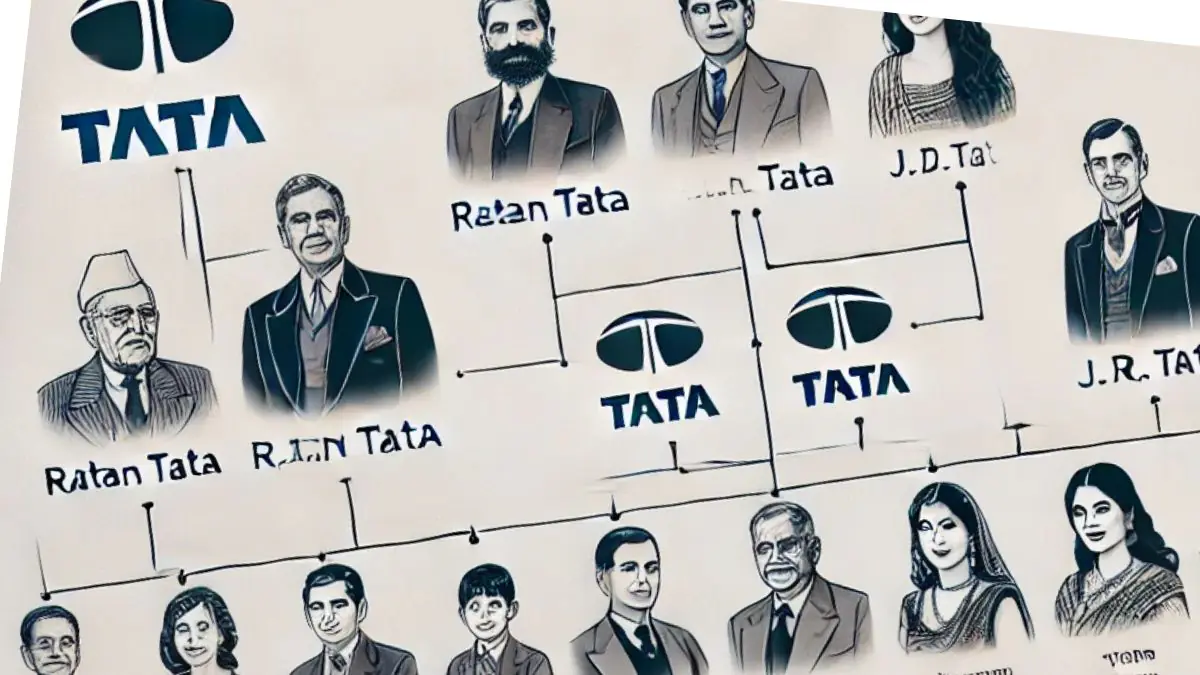Ratan Tata Family Tree In English The Ratan Tata Family Tree stands as a testament to a legacy deeply rooted in the realms of business, philanthropy, and social impact. Originating from a lineage of visionaries and pioneers, the Tata family has played a significant role in shaping India’s industrial landscape and societal development. This article delves into the rich history and heritage of the Tata family, tracing its early generations, highlighting the contributions of key family members, and exploring the enduring legacy that continues to thrive through generations. Join us on a journey through the remarkable story of the Ratan Tata Family, a saga of enterprise, innovation, and profound influence.
Introduction to Ratan Tata Family Tree In English
Ratan Tata Family Tree In English The Ratan Tata family is one of the most prominent and influential families in India, known for their contributions to business, philanthropy, and society. With a rich history and legacy, the Tata family has played a significant role in shaping the industrial landscape of the country.
Early Generations and Ancestry
Origins and Founding of the Tata Family
Ratan Tata Family Tree In English The Tata family traces its roots back to Jamsetji Tata, a visionary entrepreneur who founded the Tata Group in the 19th century. His pioneering spirit and commitment to excellence laid the foundation for the family’s success in business and beyond.
Key Ancestors and Influential Figures
Ratan Tata Family Tree In English Throughout the generations, the Tata family has been guided by key ancestors and influential figures who have left a lasting impact on the family’s legacy. From Jamsetji Tata to Ratan Tata, each generation has built upon the achievements of their predecessors, solidifying the family’s reputation for innovation and integrity.
Ratan Tata: A Brief Biography
Early Life and Education
Ratan Tata Family Tree In English Ratan Tata, the former chairman of the Tata Group, was born into the family in 1937. He studied at top universities in India and the United States, honing his skills and knowledge before embarking on his remarkable career in business.
Career Highlights and Achievements
Ratan Tata Family Tree In English During his tenure as chairman, Ratan Tata transformed the Tata Group into a global powerhouse, expanding its presence across industries and geographies. His visionary leadership and strategic decisions earned him acclaim both within the family and in the business world at large.
Family Members and their Contributions

Notable Family Members
Ratan Tata Family Tree In English The Tata family boasts a roster of accomplished individuals who have made significant contributions to business, art, and philanthropy. From Cyrus Mistry to Noel Tata, each member brings a unique perspective and talent to the family legacy.
Roles and Impact within the Family Business
Ratan Tata Family Tree In English Within the Tata Group, family members have played pivotal roles in steering the company towards continued success and growth. Their dedication to upholding the family values and vision has ensured that the Tata name remains synonymous with excellence and social responsibility.
Legacy of the Tata Family
Ratan Tata Family Tree In English The Tata family has left an indelible mark on Indian industry and economy, shaping the country’s growth trajectory for generations to come. Their legacy is one of innovation, excellence, and social responsibility.
Impact on Indian Industry and Economy
Ratan Tata Family Tree In English The Tata family’s influence on Indian industry and economy is undeniable. From establishing the country’s first steel plant to pioneering advancements in technology and manufacturing, the Tatas have played a pivotal role in driving economic development and creating employment opportunities.
Cultural and Social Contributions
Ratan Tata Family Tree In English Beyond their business acumen, the Tatas have also made significant cultural and social contributions. Their support for arts, education, and healthcare initiatives has enriched the fabric of Indian society, fostering a culture of philanthropy and giving back.
Philanthropic Endeavors and Social Impact
Ratan Tata Family Tree In English The Tata Group’s commitment to philanthropy and social impact is a cornerstone of their ethos. Through a range of initiatives and programs, they have made a tangible difference in the lives of millions, improving access to healthcare, education, and livelihood opportunities.
Tata Group’s Philanthropic Initiatives
Ratan Tata Family Tree In English From the Tata Trusts to the various corporate social responsibility initiatives, the Tata Group has consistently demonstrated a deep commitment to giving back to society. Their philanthropic endeavors have set benchmarks for corporate social responsibility globally.
Community Development and Welfare Programs
Ratan Tata Family Tree In English The Tata Group’s community development and welfare programs have empowered communities across India, providing access to essential services, infrastructure, and sustainable livelihoods. Through partnerships and collaborations, they have driven positive change at the grassroots level.
Business Empire and Succession Planning
Ratan Tata Family Tree In English The Tata Group’s business empire spans diverse sectors and geographies, presenting a legacy of resilience and growth. Their strategic approach to succession planning ensures continuity and leadership excellence for the future.
Growth and Diversification of the Tata Group
From automobiles to hospitality, the Tata Group’s journey of growth and diversification is a testament to their entrepreneurial spirit and strategic vision. Continuously adapting to market dynamics, they have expanded their footprint globally while staying true to their core values.
Succession Planning and Future Leadership
With a focus on grooming next-generation leaders and fostering a culture of innovation, the Tata Group is well-positioned for the future. Their meticulous succession planning ensures a seamless transition of leadership, safeguarding the legacy of the Tata family.
Conclusion: Reflections on the Ratan Tata Family Tree
The Ratan Tata family tree stands as a testament to resilience, innovation, and social impact. From their pioneering contributions to Indian industry to their unwavering commitment to philanthropy, the Tatas have set a benchmark for sustainable business practices and ethical leadership. As the legacy continues to evolve, one thing remains clear: the Tata family’s impact on India and beyond is enduring and inspirational.
In conclusion, the Ratan Tata Family Tree exemplifies a legacy characterized by resilience, innovation, and a steadfast commitment to making a positive impact on society. From its humble beginnings to its present-day stature as a global conglomerate, the Tata family’s contributions have left an indelible mark on business, philanthropy, and community development. As we reflect on their remarkable journey, it becomes evident that the values of integrity, excellence, and compassion continue to guide the Tata family forward, ensuring a legacy that transcends generations and inspires future endeavors.
Frequently Asked Questions (FAQ)
Who is Ratan Tata and what is his significance in the Tata family tree?
Ratan Tata is a highly influential member of the Tata family, one of India’s most prominent business dynasties. Ratan Tata became the Chairman of Tata Sons in 1991, overseeing a period of significant global expansion for the conglomerate.
His leadership is marked by bold acquisitions such as Jaguar Land Rover and Corus Steel, and the introduction of the Tata Nano, the world’s most affordable car. Ratan Tata is known for his vision, ethical leadership, and commitment to innovation, cementing his place as a key figure in the Tata family tree.
How has the Tata family contributed to philanthropic causes and social impact?
The Tata family has long been committed to philanthropy and social development. Through initiatives spearheaded by Tata Trusts, a large portion of the family’s wealth has been reinvested into society. Some notable contributions include:
The founding of institutions like the Tata Institute of Social Sciences (TISS), the Tata Memorial Hospital, and the Indian Institute of Science (IISc).
Major contributions to healthcare, education, and rural development programs, impacting millions of lives across India.
Support for scientific research, disaster relief, and community development projects.
The Tata family’s dedication to nation-building through corporate social responsibility has left a lasting impact on both India and the world.
What are some key milestones in the history of the Tata family business empire?
The Tata family’s business empire has achieved several significant milestones, including:
1868: Jamsetji Tata founded the Tata Group, laying the foundation for India’s largest conglomerate.
1907: The establishment of Tata Steel, India’s first steel manufacturing company, marked the beginning of Tata’s industrial dominance.
1991: Under Ratan Tata’s leadership, the group expanded globally with key acquisitions such as Tetley Tea, Jaguar Land Rover, and Corus Steel.
2008: The launch of the Tata Nano, aimed at providing affordable transportation for millions of Indians, showcased the group’s commitment to innovation.
These milestones reflect the Tata family’s ongoing contribution to India’s industrial growth and their evolution into a global business powerhouse.
How is succession planning within the Tata family managed for future leadership?
The Tata family places great emphasis on succession planning to ensure strong and ethical leadership for future generations. Although the Tata Group is now primarily managed by Tata Sons, with professional leadership such as N. Chandrasekaran as Chairman, the family continues to play an influential role in strategic decisions.
The Tata Group’s focus is on choosing leaders based on merit, ethical values, and long-term vision, ensuring continuity and stability. The group also prepares future leaders by instilling the Tata values of integrity, innovation, and social responsibility, safeguarding the legacy for future generations.

